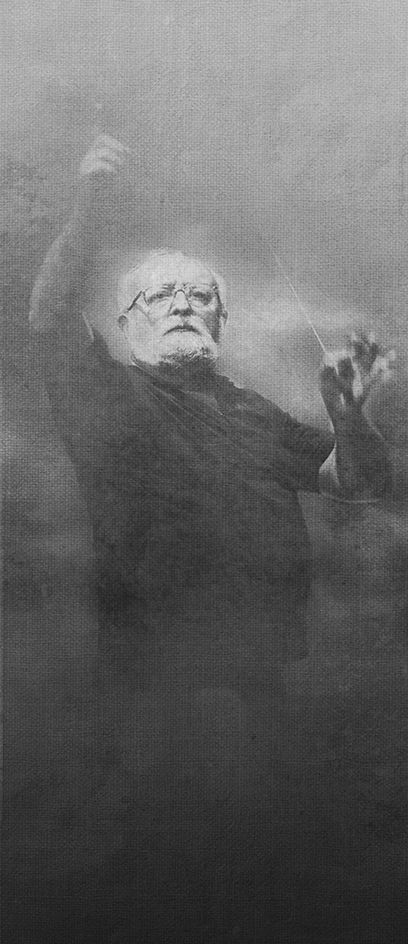
Krzysztof Penderecki
composer and conductor
(born on 23.11.1933 in Dębica)
Lonely moments spent over musical notation on paper are the most important hours of my life. And walking through the park, my place on earth - Krzysztof Penderecki in an interview in 2008.
Krzysztof Penderecki is a real phenomenon in the history of world music. He is considered, next to the Russian Igor Stravinsky, as the greatest composer of the twentieth century.
Penderecki began the adventure with music during his childhood, with private tutelage in grand piano. However true love found Krzysztof the time when he heard the violin of his father. The sounds coming out of the instrument fascinated the young man to the extent that he started dreaming of becoming a virtuoso musician. He began to pursue this goal during his schooling stage – by performing sonatas of Bach, animating the school's musical life, and founding the first music ensembles.
Penderecki began his real education in composition in Kraków, at the State Higher School of Music. It was at this time that his talent truly broke out. In a nationwide Competition for Young Composers in 1959, the 28-year-old won the first, second and third place. A score for one of the winning pieces, Strofa, soon ended up in Germany, from where it made a name for itself in the whole of Europe. This was the way that the young Penderecki, made the transformation from a complete unknown to a star composer of world format virtually overnight.
In 1960 Penderecki proved that the success of the previous year was not accidental. Written by him piece entitled "8'37 ''" (this is exactly the duration on the composition) received an award at the festival in Paris, becoming a radio hit known as Tren Ofiarom Hiroszimy (Threnody for Victims of Hiroshima).
In the sixties, Penderecki established connections with other Polish composers, including Henryk Mikołaj Górecki and Wojciech Kilar. This group of young artists quickly stole the hearts of music lovers and started to set new trends themselves. In this way Penderecki laid the foundations for a new musical genre - focused on avant-garde and non-standard methods of extracting sound - known as sonorism.
Echoes of sonorism can be heard in another famous Penderecki piece - Fluorescencje (Fluorescences 1962) which was first presented in Germany . The composer, besides the symphonic instruments, introduced for his own use a number of common objects that emit sounds - strips of sheet metal, pieces of glass, metal, a wood saw and a typewriter. At the same time, he did not resign from conventional solutions, as is clearly evident in another well known composition – which uses a well balanced tone range Pasja według św. Łukasza (Passion according to St. Luke 1966).
The composer continued his triumphs in the seventies. His symphonies and requiems, in which Penderecki finally departed from the avant-garde style are now recorded in the annals of history of world music.
Many of Penderecki's works contained political and historical contexts. He dedicated is compositions to, among others, victims of the events of December 1970 in Poland (track Lacrimosa), cardinal Wyszyński (Agnus Dei), Warsaw Uprising (Dies Irae), or the victims of the Katyń massacre (Libera me, Domine).
The 82-year-old Penderecki continues working unabated to this day. He is still pursuing new music projects - as a composer, conductor and a teacher. He also performs during live concerts, delighting audiences around the world.
Do you know?
- In the sixties Penderecki briefly took up film music. He composed the soundtrack for the film by Wojciech Has's The Saragossa Manuscript.
- Many filmmakers used compositions by Penderecki. We can admire them in such films as Kubrick's The Shining, The Exorcist by Friedkin and Mask by Brothers Quay.
- Penderecki's compositions gave inspiration to other musicians. Johnny Greenwood, the guitarist of the British rock band Radiohead, composed a song 48 Responses to Polymorphia which draws upon Penderecki's musical output.
- The political context in the music of Penderecki did not find universal approval. Some described it as music of moral blackmail or sacro polo (a reference to a non-ambitious mainstream of Polish dance music called disco polo).
- Penderecki shows a soft spot for sacred music. His adoration of it has to do with his childhood. Dębica, the home town of the composer, was inhabited by more than 60% of Jews. Young Penderecki, as a representative of the Catholic minority, sought to nurture his own faith and to manifest it - also through his music.
- In 2005, Krzysztof Penderecki was awarded the Order of the White Eagle - the highest Polish state distinction.






